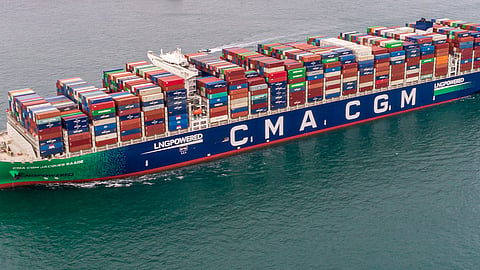CMA CGM Takes Another Major Step Towards Sustainable Shipping
The CMA CGM Group, a global leader in sea, land, air and logistics solutions, is joining the partners of the Jupiter 1000 industrial demonstrator project piloted by GRTgaz in Fos-sur-Mer.
This innovative installation aims to produce green hydrogen from renewable power and also e-methane, a synthetic gas using this hydrogen and CO2 captured from the industrial process.
Through its participation in the project, CMA CGM aims to further accelerate the pace of its fleet’s transition to new very low-carbon fuel sources.
With Jupiter 1000, GRTgaz intends to provide solutions to the challenge of decarbonizing gas networks and the intermittent nature of renewable energies.
The idea is to convert a portion of renewable power, at times when it is abundant, into low-carbon energy (hydrogen and e-methane) so it can be stored on a large scale and for lengthy periods.
Following a study phase, plus the award of administrative, then building permits, the first electrolyzer (producing hydrogen from water and renewable power) injected hydrogen into GRTgaz’s gas transmission network in February 2020.
A second electrolyzer, employing a different technology from the previous one, successfully entered service at the beginning of November 2021.
Beyond producing hydrogen, Jupiter 1000 also recycles CO2 by converting it into synthetic gas.
How Sustainable is the Future of Logistics?
The Jupiter 1000 demonstrator project, which is perfectly integrated with the local ecosystem, benefits from the expertise of several partners.
CMA CGM will bring to the Jupiter 1000 project its expertise in shipping and logistics, as well as guidance and fresh insights from its perspective on customer needs.
Jupiter 1000 is a project that has regularly attracted visits from international delegations since it was commissioned (Netherlands, Germany, Spain, Quebec, California, etc.).
A key milestone in efforts to find alternatives to hydrocarbons
The CMA CGM Group is committed to the energy transition and has set itself the goal of Net zero carbon emissions by 2050.
In pursuit of this goal, the Group is focusing on low-carbon fuels to power its ships.
By providing access to the results of its green hydrogen production, methanation and CO2 capture, Jupiter 1000 will enable CMA CGM to accelerate development of the production sector for synthetic methane, a key fuel for the decarbonization of its operations.
CMA CGM already has 28 “e-methane ready” dual-fuel, LNG-powered containerships and will have a total of 44 vessels of this type in service by the end of 2024.
Liquefied Natural Gas (LNG) reduces sulfur oxide emissions by 99%, fine particle emissions by 91% and nitrogen oxide emissions by 92%. That makes a significant contribution to improve air quality.
Thanks to the dual-fuel gas-powered technology developed by CMA CGM, which currently runs on LNG, bioLNG and synthetic methane can already be used by its ships.
Christine Cabau Woehrel, Executive Vice-President of the CMA CGM Group, in charge of Industrial Assets and Operations, commented: “The Jupiter 1000 project is of great interest to the CMA CGM Group as part of our efforts to find very low-carbon new fuel sources.
"The Jupiter 1000 project will give us access to one of the first demonstrator projects of the kind. Moreover, it is located at Fos-sur-Mer, where we recently completed our first LNG bunkering operations. We intend to support the potential emergence of a whole new industry.”
Read More: DHL Purchases 33 Million Litres of Sustainable Aviation Fuel


